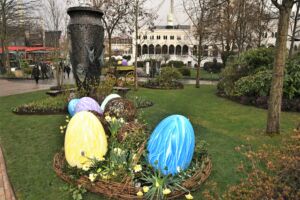News
Why has Easter got so expensive?
This article is more than 2 years old.
Prices at zoos, themeparks, museums, cinemas and theatres have all outstripped the going rate in recent years

Egg-pensive at the likes of Tivoli (photo: Hasse Ferrold)
Easter is mostly a time for family, but with so many public holidays (not only is Good Friday and Easter Monday a day off, but also Maundy Thursday!) it can get boring watching Farmor hitting the schnapps, so many choose to take their children on a pleasure excursion over the long weekend.
Well, bad news! A day out has become a major expense for families in recent years, according to an analysis of consumer prices since 2016 by Danmarks Statistik.
For example, ticket prices for museums and zoos have shot up by 41 percent during that time, themeparks and cinemas are 29 percent more expensive, and theatre tickets have risen by 23 percent.
In comparison, consumer prices have only increased by around 18 percent.
Swimming pool still good value
Nevertheless, there are still a few options that have not increased steeply, including the local swimming pool and water parks, which have only risen by 19 percent – almost exactly in line with consumer prices.
The most popular attractions are the zoos followed by the themeparks.
According to Danmarks Statistik, 13 percent of adults in Denmark visited a zoo or animal park during the spring of 2022, and 11 percent visited a themepark (Tivoli, which reopened last weekend, has increased its entry prices by 10 kroner).
Circuses, the popular choice of yesteryear, managed only 2 percent.










































